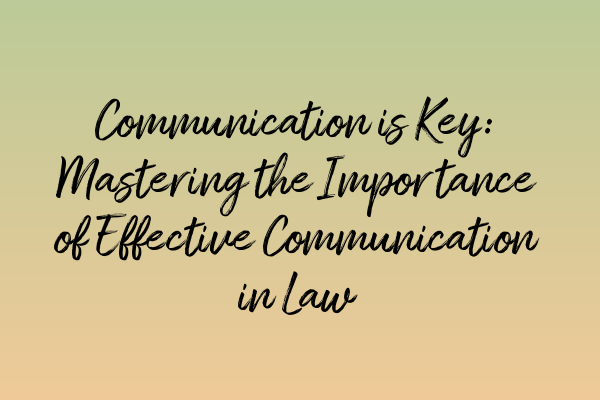Communication is Key: Mastering the Importance of Effective Communication in Law
In the legal field, effective communication is of utmost importance. It is the foundation on which relationships are built, cases are won, and justice is served. Whether you are a solicitor, barrister, or legal professional, the ability to communicate effectively is a skill that must be mastered.
Effective communication involves not only the clarity of your words but also the ability to actively listen and understand your clients, colleagues, and opposing parties. It is a two-way street that requires both speaking and listening with intent. When communication is done right, it can lead to better collaboration, stronger advocacy, and more successful outcomes.
So why is effective communication so important in the legal profession? Let’s explore some key reasons:
1. Building Trust and Rapport with Clients:
When clients seek legal advice or representation, they are entrusting their personal or business matters to their solicitor. Effective communication helps build trust and rapport with clients, ensuring they feel heard, understood, and supported. By actively listening to their concerns, explaining complex legal concepts in plain language, and providing regular updates on their case, you can establish a strong attorney-client relationship based on trust and confidence.
2. Advocacy and Negotiation:
Effective communication is essential when advocating for your clients’ interests or engaging in negotiations. Whether you are making persuasive arguments in court or trying to settle a case through negotiation, clear and compelling communication can greatly enhance your ability to make your case and persuade others. Strong communication skills enable you to articulate your client’s position, present evidence, and convince others of the merits of your argument.
3. Collaboration with Colleagues and Opposing Parties:
The legal profession often involves collaboration with colleagues, experts, and even opposing parties. Effective communication ensures that everyone is on the same page, understands their roles and responsibilities, and works together towards a common goal. By communicating clearly and concisely, you can avoid misunderstandings or conflicts that may arise from poor communication. Collaboration fueled by effective communication can lead to more efficient case management and successful outcomes.
4. Enhancing Legal Writing:
Good communication skills are equally important in legal writing. Whether it’s drafting legal documents, contracts, or client letters, the ability to express complex legal concepts in a concise and clear manner is crucial. Effective legal writing involves using plain language, organizing information logically, and providing accurate and relevant details. When your written communication is strong, it not only enhances your professional reputation but also ensures your clients understand the information you are conveying.
To further delve into related legal topics, check out these articles that explore various aspects of criminal law:
– Private Prosecutions: Exploring Non-Governmental Prosecutions in Criminal Cases
– Rights of the Accused: Protecting Individual Liberties in Criminal Proceedings
– Magistrates’ Court vs Crown Court: Understanding Key Differences
– Protecting Vulnerable Witnesses in Criminal Trials: Best Practices and Legal Safeguards
– Unraveling the Complexities of UK Bail Laws
In conclusion, effective communication is an invaluable skill for solicitors and legal professionals. It plays a vital role in building trust with clients, advocating for their interests, collaborating with colleagues, and ensuring successful outcomes. By continuously honing your communication skills and staying up-to-date with legal developments, you can become a more effective solicitor and achieve better results for your clients.


Leave a Reply